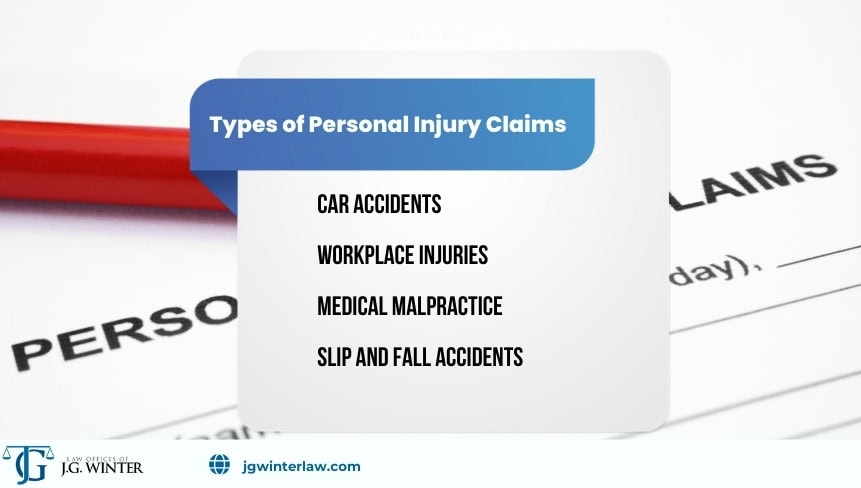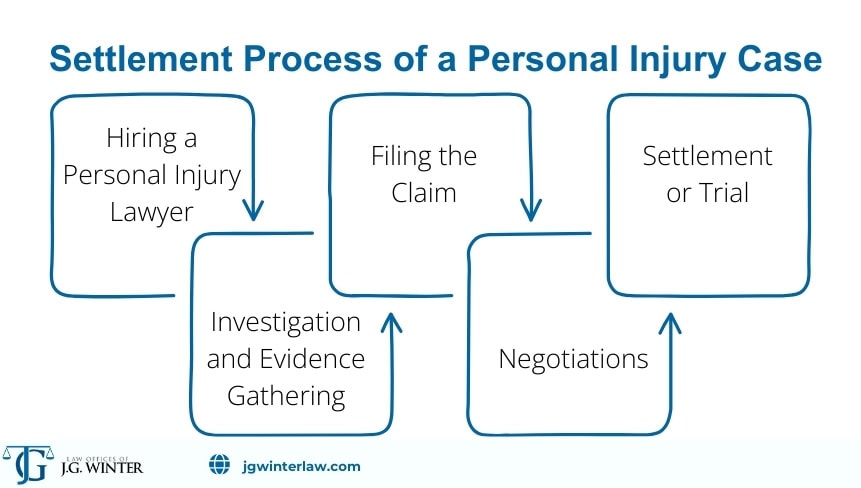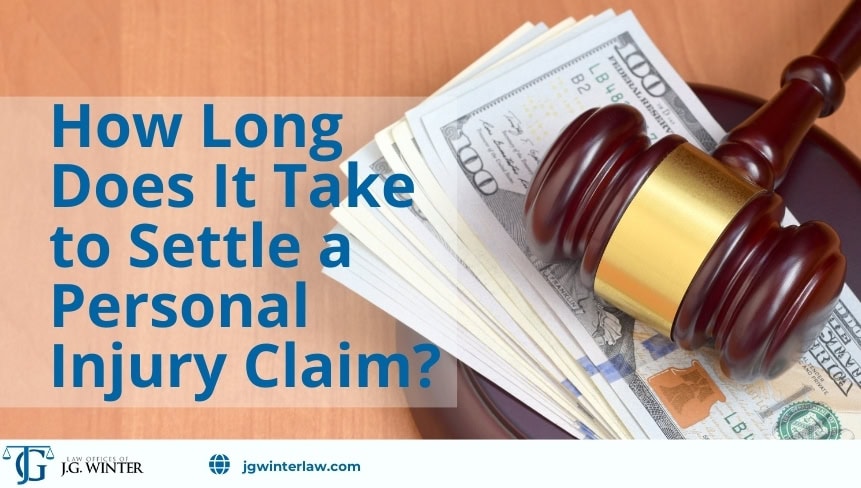The timeline for settling a personal injury claim can vary greatly. Each case is unique, with its own details that can make the process quicker or slower. Understanding how long it does take to settle a personal injury claim is crucial for planning and managing your expectations. We can guide you through the personal injury settlement process and help you receive the support and representation you need. Our personal injury lawyers fight for your rights and work tirelessly to secure your compensation.
Understanding personal injury claims
A personal injury claim is when you ask for money because someone else caused you harm. It could be due to carelessness or a direct action that led to your injury. Pursuing a claim helps you recover money spent on medical treatments, lost pay if you couldn’t work, and the trouble and pain you’ve gone through. The main aim is to get you financially back to where you were before the injury.
Types of personal injury claims
 Personal injury law covers a wide range of incidents, each with its own legal considerations. Understanding the various types of personal injury claims is crucial for anyone who has suffered harm due to another’s actions.
Personal injury law covers a wide range of incidents, each with its own legal considerations. Understanding the various types of personal injury claims is crucial for anyone who has suffered harm due to another’s actions.
Car accidents
Car accidents are among the most common reasons people file personal injury claims. These accidents can range from minor fender benders causing whiplash to serious collisions resulting in long-term injuries or disabilities. Car accident claims help you prove that another driver’s negligence or wrongful action caused the accident that led to your injuries.
Workplace injuries
Not all workplace injuries are covered solely by workers’ compensation. In certain cases, like when an employer’s gross negligence causes an accident, a personal injury claim can be viable for compensation. It addresses injuries resulting from unsafe work environments, faulty equipment, or lack of proper training.
Slip and fall accidents
Also known as premises liability claims, slip and fall accidents occur when someone is injured on another’s property due to unsafe conditions, such as wet floors, poor lighting, or uneven surfaces. Property owners have a duty to keep their premises safe for visitors, and failing to do so can make them liable for injuries.
Medical malpractice
When healthcare professionals fail to provide the standard of care expected, resulting in injury or harm to a patient, it may lead to a medical malpractice claim. It involves misdiagnoses, surgical errors, improper treatment, pharmacy errors, and more. Due to the complexity of proving negligence in healthcare, these claims require a thorough understanding of legal and medical issues.
Factors influencing the timeline of personal injury settlements
Several factors can make settling personal injury claim longer or shorter. The complexity of the case, and the severity of your injury, can all change the timeline.
Complexity of the case
If your case is complicated, with serious injuries or if it’s hard to prove who was at fault, it might take longer to settle. Cases with big disagreements about what happened or how badly someone is hurt can take more time because everyone involved needs to look at the details very closely.
Medical treatment duration
The duration of your medical treatment can influence the timeline of your claim settlement. It’s often recommended to wait until your medical providers can determine the long-term effects of your injuries. While this might extend the settlement process, it ensures that your compensation accurately reflects your needs, covering all necessary medical expenses and adjustments for any lasting effects.
Insurance company negotiations
Negotiating with insurance companies can take a while. These companies often take their time with offers and negotiations. The back-and-forth process of making and responding to offers can extend the timeline of your claim.
Legal proceedings
If your case goes to court, expect more delays. Court cases can add months or even years to the timeline, especially if the case is complex or the courts are busy. Going to trial involves preparation, hearings, and possibly appeals, all of which take time.
The settlement process of a personal injury case

The process of settling a personal injury case involves several key steps, from seeking legal help to possibly going to court. Each step plays a crucial role in how your case is resolved and how much compensation you might receive in the personal injury lawsuit process:
1. Hiring a personal injury lawyer
One of the first steps after getting injured is finding a good personal injury lawyer to represent you to get the best outcome. They know the law well and can guide you through each step, making things less stressful for you.
2. Investigation and evidence gathering
Your lawyer looks into your case and gathers evidence such as photos from the accident scene, medical records, and witness statements. It helps build your case by showing what happened and how it has affected you.
3. Filing the claim
Your lawyer will help you file the claim. It involves preparing legal documents explaining your case, injuries, and expected compensation. The legal process starts with the submission of these documents.
4. Negotiations
Before going to court, there’s often a chance to settle the case out of court. Your lawyer negotiates with the other party’s insurance company or lawyer to try and agree on a fair personal injury settlement amount.
5. Settlement or trial
Many personal injury cases are settled without going to trial. But if you can’t agree, your case might go to trial. At trial, a judge or jury hears your case and decide the outcome. Your attorney argues your case in court to get you the best possible result.
Tips for speeding up your personal injury claim settlement
While some factors are out of your control, there are steps you can take to speed up process of your personal injury claim settlement.
1. Keep detailed records: Keep detailed records of everything related to your injury and claim. It includes medical reports, receipts, and any communication with insurance companies. Having all your information organized can help your lawyer move your case forward more quickly.
2. Seek medical attention immediately: Don’t wait for medical help after an accident. Seeing a doctor right away supports your health and creates a timely record of your injuries. The medical documentation proves the extent of your injuries in your claim.
3. Respond quickly to your lawyer: Your personal injury attorney might need more information or decisions from you. Responding quickly to these requests can prevent delays. The faster you provide the needed details, the quicker your lawyer can act.
4. Be ready to negotiate: Sometimes, accepting a fair settlement offer is faster than holding out for a higher amount that may come from a trial. Be open to your lawyer’s advice on settlement offers. A good settlement can provide the compensation you need without the uncertainty of a trial.
The right time to consult a personal injury lawyer
Knowing the right time to seek legal advice can be crucial for your personal injury claim. A lawyer helps you navigate the claim process effectively.
1. After receiving medical care: Once you are treated for your injuries, consult a lawyer to understand your rights and the potential for compensation.
2. If liability is disputed: If the person or company responsible for your injury denies their fault, or if the situation is complex, a lawyer can help. They gather evidence and argue on your behalf to establish liability.
3. When dealing with insurance companies: Insurance companies often aim to settle for the least amount possible. A lawyer can negotiate with them to help you secure a fair settlement.
4. Before signing any settlement offers: You must consult a lawyer before agreeing to any settlement offers. They can review the terms to ensure it’s in your best interest and advise whether to negotiate for more or proceed to trial.
J.G. Winter Law for a speedy personal injury claim settlement
Understanding how long it takes to settle a personal injury claim helps you know what to expect. Keeping everything organized, getting medical help right away, and talking clearly with your lawyer can speed things up. From understanding your case to negotiating with insurance companies, each step plays a role in getting you the money you deserve quickly and fairly.
If you’re looking for help settling your claim quickly, J.G. Winter Law is here for you. Our personal injury lawyers help you get the best help and the quickest settlement possible. We take care of the hard work so you can focus on getting better. Contact us today.
FAQs
What is the average payout for a personal injury claim in the USA?
The average payout for a personal injury claim can vary widely, but many claims settle for anywhere between $3,000 and $75,000. More severe cases can settle for much higher amounts, especially if long-term care or severe loss of income is involved.
How long does it take to get an injury claim payout?
Once a settlement is agreed upon, receiving the payout typically takes 30 to 60 days. This time allows for the processing of legal and insurance paperwork.
What is the average payment for whiplash?
The average payment for a whiplash claim can range significantly, usually from $2,000 to $10,000 for minor to moderate cases. Severe cases involving chronic pain or long-term treatment may settle for higher amounts.
How long does it take for insurance companies to negotiate a settlement?
Negotiating with insurance companies can take a few weeks to several months. The duration depends on the case’s complexity, available evidence, and the insurance company’s willingness to settle.
What is the longest a settlement can take?
A settlement can take several years in very complex cases, especially those that go to trial. Cases involving severe injuries, disputed liability, or significant legal challenges are more likely to extend towards the longer end of the timeline.


